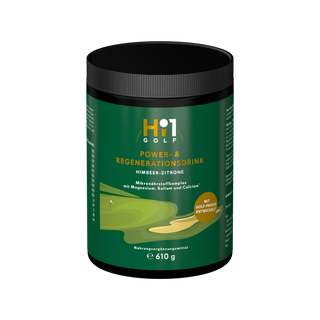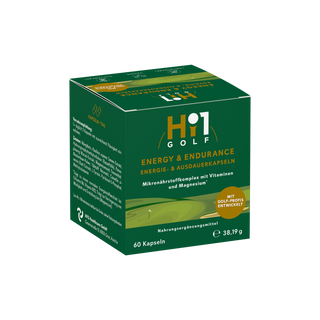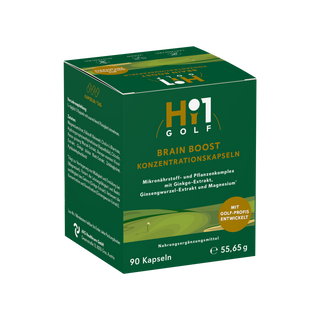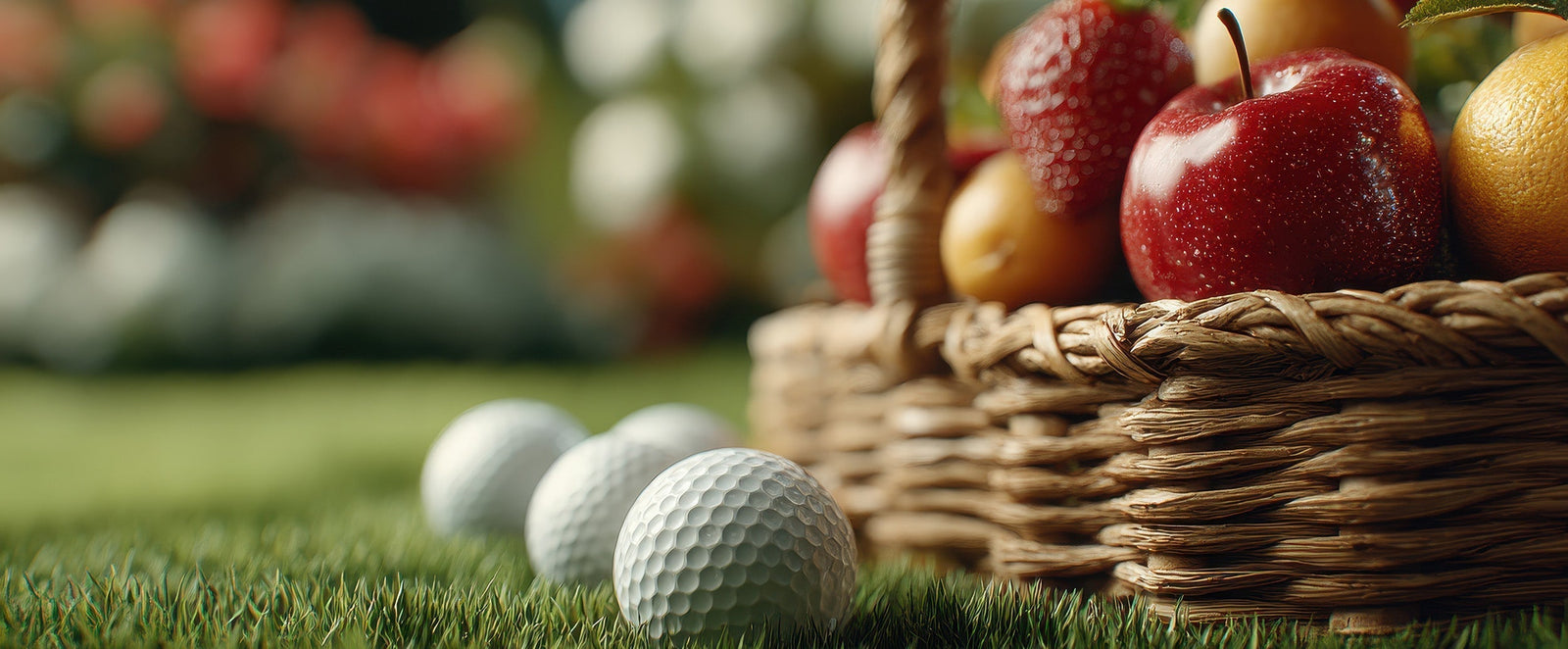Nervous before teeing off? These strategies really help
The first tee shot is one of the most exciting moments of a round of golf. Even if you've practiced the swing many times in training, the situation suddenly feels different: Your hands become sweaty, your breathing quickens, your heart rate increases. Even small external triggers , such as observant glances or an unfamiliar tee shot , can cause inner unrest.
These physical and mental reactions are part of a natural mechanism. The body attempts to maximize performance, mobilizes energy reserves, and increases alertness. What serves a protective function in stressful situations can become a challenge on the golf course , because what's required at this moment isn't reflexes, but calmness, precision, and concentration.
Internal expectations often add to the pressure. The desire to get off to a particularly good start or avoid making mistakes shifts attention from the swing to self-critical thoughts. This mental distraction can impair the swing: The swing becomes unsteady, and focus gives way to uncertainty.
Table of contents
- Why do we get nervous before teeing off?
- Why is the first tee shot particularly emotionally charged?
- Is it even possible to get rid of nervousness?
- What happens when I consciously accept nervousness?
- What specific steps help to reduce nervousness?
- How can I further support my mental state?
- How do I keep my energy level constant during a round?
- Accept nervousness as part of the game
Why do we get nervous before teeing off?
Nervousness before the first tee shot is a typical stress reaction. The brain interprets the unfamiliar situation as a challenge and unconsciously activates protective mechanisms. The autonomic nervous system puts the body on heightened alert, regardless of whether there is a real danger or not.
Often, it's not the blow itself that's decisive, but the expectations associated with it. The desire to prove oneself or to succeed increases the tension. If attention is also drawn to possible observation by others or to unfamiliar territory, the level of arousal rises further.
Why is the first tee shot particularly emotionally charged?
The first shot marks the beginning of the round. A moment often symbolically exaggerated. It often takes place under scrutiny and, for many golfers, is the starting point where they want to make a personal statement. This significance can lead to inner tension building up more quickly.
In addition, the body is often not yet fully attuned to the environment at the beginning, and the space can seem unfamiliar. The combination of physical preparation, social attention, and personal expectations creates a complex situation that can trigger increased tension.
The important thing to remember is that a single shot, even if it's early on, isn't decisive for the entire round. Those who manage to assess this moment more calmly and place it in the overall context can find a more stable and relaxed approach to the game in the long run.
Is it even possible to get rid of nervousness?
Many golfers try to ignore or suppress tension at the crucial moment, for example, through distraction, positive reassurance, or consciously pushing the feeling away. However, this strategy often exacerbates nervousness. Attempting to suppress it draws more attention to it and can therefore have the exact opposite effect.
A more helpful approach is to consciously perceive and acknowledge your nervousness. It's not a misreaction, but rather a sign that the situation is important to you. Those who manage to accept this inner state instead of fighting it can regain more inner calm and self-control.
What happens when I consciously accept nervousness?
When nervousness is no longer viewed as a disruptive factor but accepted as part of the moment, the inner attitude changes. The situation is no longer dominated exclusively by excitement, but offers space for alignment and stabilization.
Small, repetitive actions, such as a deep breathing sequence, a structured preparation routine, or a mental focus point that provides orientation, can help. Such rituals can transform existing tension into conscious presence and help you stay focused.
What specific steps help to reduce nervousness?
Face the situation
It's understandable to prefer to avoid stressful situations, for example, by avoiding tournaments or choosing familiar playing groups. However, in the long run, it's helpful to actively face these moments. Through repeated experience, the nervous system learns to cope with this form of tension. Over time, the situations become less stressful and more manageable.
Consciously observe your nervousness
Instead of working against the feeling, it can be helpful to examine it more closely. Where in your body do you feel the tension? How does the nervousness manifest itself in your thoughts? This form of self-awareness creates inner distance. The feeling thus becomes more tangible and loses its dominating effect.
Allow the feeling
Don't try to control your nervousness directly. Often, it's enough to give it space and observe it without judging it. Like clouds passing in the sky, this feeling can come and go. It doesn't necessarily affect the entire game.
Use your breath as an anchor
Conscious breathing can help regulate stress reactions. Focus your attention on the flow of your breath: how it flows in through your nose, rises through your chest, and then escapes again. This simple concentration on your breath has a stabilizing effect and helps you regain your center in critical moments.
How can I further support my mental state?
Mental stability in golf isn't a given, as it depends on several factors. In addition to targeted training, physical well-being and a supply of certain nutrients also play an important role. An imbalanced energy balance or impaired nerve function can directly impact concentration, decision-making, and emotional resilience.
Targeted micronutrient supplementation can help maintain mental resilience. Combination products based on plant-based ingredients and essential nutrients from the Hi1 brand, which support cognitive functions and the nervous system, can be useful here, especially under high demands, such as during competitions or under climatic stress.
Typical ingredients of such products include ginkgo and ginseng, which play a role in blood circulation and stress management. Magnesium contributes to the normal function of the nervous system and can help cushion mental fatigue. Zinc and vitamin B6 also promote cognitive performance, while choline, a component of important neurotransmitters in the brain, is involved in reaction and concentration processes. Such supplementation can help you stay focused, calm, and able to act, even in demanding game situations, especially when emotional or physical fatigue increases.
How do I keep my energy level constant during a round?
Golf demands not only mental alertness but also sustained physical stability—often for several hours. A decline in energy levels quickly impacts concentration, movement accuracy, and game structure. To prevent this, in addition to adequate sleep, hydration, and a nutrient-rich diet, targeted supplementation is also possible.
Natural plant substances such as guarana or green tea extract are traditionally used to support mental alertness. Ginseng can help you cope better with physical stress. Combined with micronutrients such as vitamin B12, which contributes to energy production, or L-tyrosine, which helps with focus during mentally demanding phases, this provides comprehensive support for long runs.
Such a supplement is particularly suitable when external stress factors, such as heat, uneven terrain or tournament pressure, place additional demands on physical endurance.
Accept nervousness as part of the game
Nervousness before an important shot is not a weakness, but a normal reaction of the body to a situation perceived as significant. Especially in golf, which places high demands on precision, concentration, and self-regulation, it is common to feel inner tension before the first tee shot or at crucial moments.
Instead of trying to suppress or repress this reaction, it can be helpful to consciously acknowledge it. Nervousness shows that the moment has weight, and that's precisely what you can leverage. Learning to allow this feeling while remaining calm inside creates the foundation for clear decisions and controlled movements.
Mental techniques such as breathing exercises, a structured pre-shot routine, or short visualizations can help bring focus back to the essentials. Such rituals have a stabilizing effect on the mental state and, through regular practice, can become an integral part of your playing routine.
In addition, physical condition plays a key role. Concentration, reaction time, and emotional balance are closely linked to physiological resilience. A targeted supply of micronutrients can help support the nervous system and stabilize cognitive processes in demanding game situations.
This turns nervousness into a signal that can be understood and regulated rather than a disruptive factor. Those who internalize this approach not only strengthen their mental resilience but also develop the ability to remain controlled and focused in stressful game situations.








